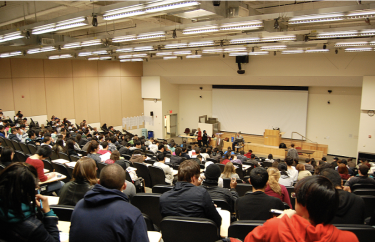Large Courses: Tools to Support Students

Written by Isaac Frierman, Sam Hensley, Pawin Taechoyotin, William Ashcraft
Large courses can present unique challenges for students. Getting the assistance and information you need to be successful can be difficult when you’re one of hundreds in a class. These resources can help give you the tools you’ll need to achieve your academic goals.
Core Principles
This guide is designed to improve your experience as a student in large courses.
In this guide, you will learn:
- How to make the most of your learning experience
- How to form relationships with your classmates and faculty in large course environments
- How to set yourself up for success in large lecture courses
- What steps to take if you are struggling with the learning environment in large courses
Guidelines and Approaches
There are many simple preparations you can make to improve your experience as a student in a large course, including:
- Read Your Syllabi:
At the beginning of the semester, carefully read the syllabi for your courses and take note of important dates, expectations, and resources. You might write out all due dates for the semester into your calendar, make note of your instructors’ contact information and office hours, and ensure you’ve located all the course materials you’ll need for the semester. If you have questions after reviewing the syllabus, reach out to your instructor.
- Meet Your Instructors and Classmates:
Introduce yourself to your instructors and TAs and make an effort to keep in touch with them throughout the semester. When you attend a lecture, introduce yourself to your classmates and make an effort to get to know them. You might form study groups, ask each other questions, and work on projects together. It can be intimidating to reach out at first, but forming a community will significantly improve your experience in a large course. You can also form groups to communicate with your classmates on Canvas.
- Make a Schedule:
Be proactive about planning out when you need to work on assignments throughout the semester. Start from your due dates and work backwards and leave time to consult your instructors for clarification or feedback.
- Take Detailed Notes:
It can be difficult to stay engaged in a large lecture hall, but you can improve your experience by writing down key points, questions you have, and points to expand on later. Follow up with your classmates after class to find out what others’ key takeaways from class were and other questions you might consider going forward. Here are a variety of note taking strategies you can try.
- Measure Your Progress and Success:
Return to the course objectives in the syllabus throughout the semester and take the opportunity to recognize how much you’ve learned. Especially in a large course, it can be difficult to feel your own progress in the moment, but it’s important to reflect often to see where you’ve grown and where you can still improve. If you don’t think you are meeting specific course objectives, visit your instructor’s office hours and ask for their feedback and advice. We have provided 3 example question sets to start your reflection activity.- What were the lessons taught in class in the past week? Which topics were new to me?
- What do I remember from the beginning of the semester? Which were topics/things I struggled with at the beginning of the semester, and which are no longer hard for me to solve?
- What were the topics that resonated with me the most? Were there any topics that solved some of my daily life problems?
- Studying for an Exam:
An exam is meant to test the level of understanding on the course topics taught within class and the ability to apply those concepts to different settings. To effectively study for the exam, you should review the methods in your homework, labs, assignments, textbook and lecture notes. Making a summary page of each topic is useful as well. Studying with a group of friends can be useful, since explaining a topic to others is inherently testing your level of understanding on the topic. If practice exams are provided, keep in mind that the actual exam might be different in terms of format and style, but the underlying topics will be the same.
- Familiarize Yourself with Course Technologies:
Look through the Canvas page for your course, see where resources and course materials are located, and what features are available to make your experience easier. You can use the calendar and notification functions to keep on top of your assignments and deadlines, and some courses will have discussion boards or groups to make it easier to connect with your classmates. If you have questions about the online course organization, reach out to your instructor. The instructions to set up the calendar and notifications functions in canvas can be found through the Office of Information Technology (OIT).

Considerations
Some questions you should keep in mind throughout the semester are:
- How should I prepare for each class session? What is expected before, during and after class?
- How am I being graded? What happens if I miss class? What is dropped?
- Who should I contact with certain questions? How do I reach them?
- Will this course be a good fit for my schedule, goals, and interests?
- What are my expectations and goals for this class? What can I do to ensure these are met?
- How much time do I have between classes, especially if they are on different campuses? What will the logistics of my day and week look like? Is my course load too much for me to handle?
- What information is going to be most important in the class, especially for exams and assignments?
- Do exam times interfere with my other classes or make me unable to take another class?
- How will I hold myself accountable throughout the semester?
Sample Tools for Success
Below are some examples of the tools you can use towards being successful in your large courses (please note, this is not an exhaustive list):
- The most important time to make a schedule for yourself is for anticipated stressful times in the semester such as before an exam
- Work in time for yourself and your plans-working earlier than later allows spontaneity/unexpected things to not ruin your schedule
- Try and connect with classmates
- Give yourself extra time if you’re not sure how long something will take
- See more tips for using calendars and time management.
- Steps to communicate with emails:
- Write the email, DO NOT SEND the email yet, consider who this email is for, who is the primary recipient, what do you expect them to do, who are the secondary recipients, is it only an FYI for them and keep them in the loop
- Leave it for at least 6 hours
- Reread the email, revise and edit as necessary, consider the tone and how the recipient will react to the email. MAKE IT AS CONCISE AS POSSIBLE
- Repeat step 2 - 3 until you are sure that all the necessary information is included and the key points have been explicitly addressed
- Send the email and wait patiently until a response is received
- Frequently check your email, you might get instant responses
- Extension Request
- Exam Conflict
- Regarding Request
- Misgrading Inquiry
- Missing Class and Getting Attendance
Professors will often have a certain way they want you to write essays, but keeping in mind some of these ideas may help.
- Steps to understand grading:
- What are the categories I am graded on and what percentage of my grade are they worth?
- How much is each exam worth?
- How many classes or assignments can I miss (perhaps say scheduling conflict or something) without affecting my grade?
- How are my assignments graded i.e. how much is each question worth, completion/participation or credit based on correctness
- Is there a chance to make up activities/what happens on late assignments? If it is not mentioned, ask the professor what you can do(kindly-there may be nothing but it is worth a try)
- Who do I talk to about grading? (usually TA or professor)
- What extra credit opportunities are available?
- What are the categories I am graded on and what percentage of my grade are they worth?
Additional Resources
CU offers a whole range of resources to help you succeed in your classes:
| Tutoring CU has a lot of free support options for all sorts of different classes. When getting help with homework, communicate the boundary of tools/theories that you are allowed to use to the tutor. | Academic Support & Academic Advising |
| Mental Health Resources |
|
| Career Development | Medical Resources |
| Volunteering & Community Service |
|
| Library Research Guides | Recreational Center (access is mostly included in tuition)
|
| Campus Map | Canvas Tutorial |

Next Steps
- Start exploring learner resources-save this page!
- Stay on top of your class-find what works and keep it up
- Figure out what resources from each class work best for your success
- Make your schedule ahead of time to make stressful times in the semester easier
- If you want to, meet people in your classes and work collaboratively
- Stay updated on class announcements and changes in the course
- Assessment
- Course & Curriculum Development
- Understanding Your Learners
- Understanding Yourself as an Educator
- Learner Engagement
- Inclusivity & Student Support
- Address Accessibility for All Students
- Community-Developed Resources
- Create a Supportive Course Climate
- Foster an LGBTQIA+Classroom
- Help Students Reflect on their Work
- Large Courses: Tools to Support Students
- Student Support Toolkit
- Supporting Multilingual International Students in the Classroom
- Use High Impact Practices (HIPs)
- Enhancing the Learning Environment
- Professional Development & Research
- New CU Educators
- Books We Recommend

